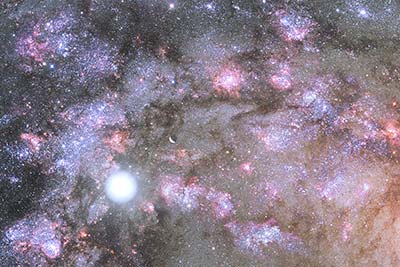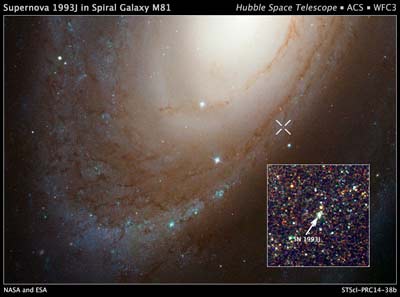Recent Astronomy Finds: Hubble Finds Companion Star, Early Galaxy
Published 09/10/2014

(Berkeley, California) – Astronomers utilizing NASA's Hubble Space Telescope recently happened upon two more remarkable revelations. In one case, they've spotted a star hiding behind the supernova of its companion star. Another discovery: scientists have for the time gotten a glimpse of a massive galaxy under construction some 11 billion years ago. (Above:
The supernova is a rare one as it has a two-star system where one has exploded and the other apparently fueled the mass-loss from the exploding star. Scientists had been looking for more clues about certain kinds of supernovae in these binary star system settings, and this is the first time they have been able to see the faint glow of the still-remaining star and separate it visually from the blinding light of the explosion behind it.
From there, they were able to discern numerous aspects of the star system's demise.
"The companion star stole a bunch of hydrogen before the primary star exploded," said team member Alex Filippenko, professor of astronomy at UC Berkeley.
The explosion happened in the galaxy M81, which is about 11 million light-years away from Earth in the direction of the constellation Ursa Major (the Great Bear). Light from the supernova was first detected in 1993, and the object was designated SN 1993J.
Another first is a look at the building of a galaxy that became much more full of stars than our own galaxy just three billion years after the beginning of the universe. The galaxy is dubbed “Sparky,” and scientists say it was forming new stars at a ferocious rate.
Erica Nelson of Yale University in New Haven, Connecticut, lead author of the science paper announcing the results, said this would be impossible now.
"We suspect that this core-formation process is a phenomenon unique to the early universe because the early universe, as a whole, was more compact.” Nelson said. “Today, the universe is so diffuse that it cannot create such objects anymore."
Although only a fraction of the size of the Milky Way, the tiny powerhouse galaxy already contains about twice as many stars as our galaxy, all crammed into a region only 6,000 light-years across. The Milky Way is about 100,000 light-years across.
This barely visible galaxy may be representative of a much larger population of similar objects that are obscured by dust. There are likely even more such galaxies out there that can't be seen.
Researchers believe it did not keep up that pace of star formation for long. It likely stopped making stars in the packed core. Smaller galaxies then might have merged with the growing galaxy, making it expand outward in size over the next 10 billion years, possibly becoming similar to one of the mammoth, sedate elliptical galaxies seen today.
Below: the super nova.

|